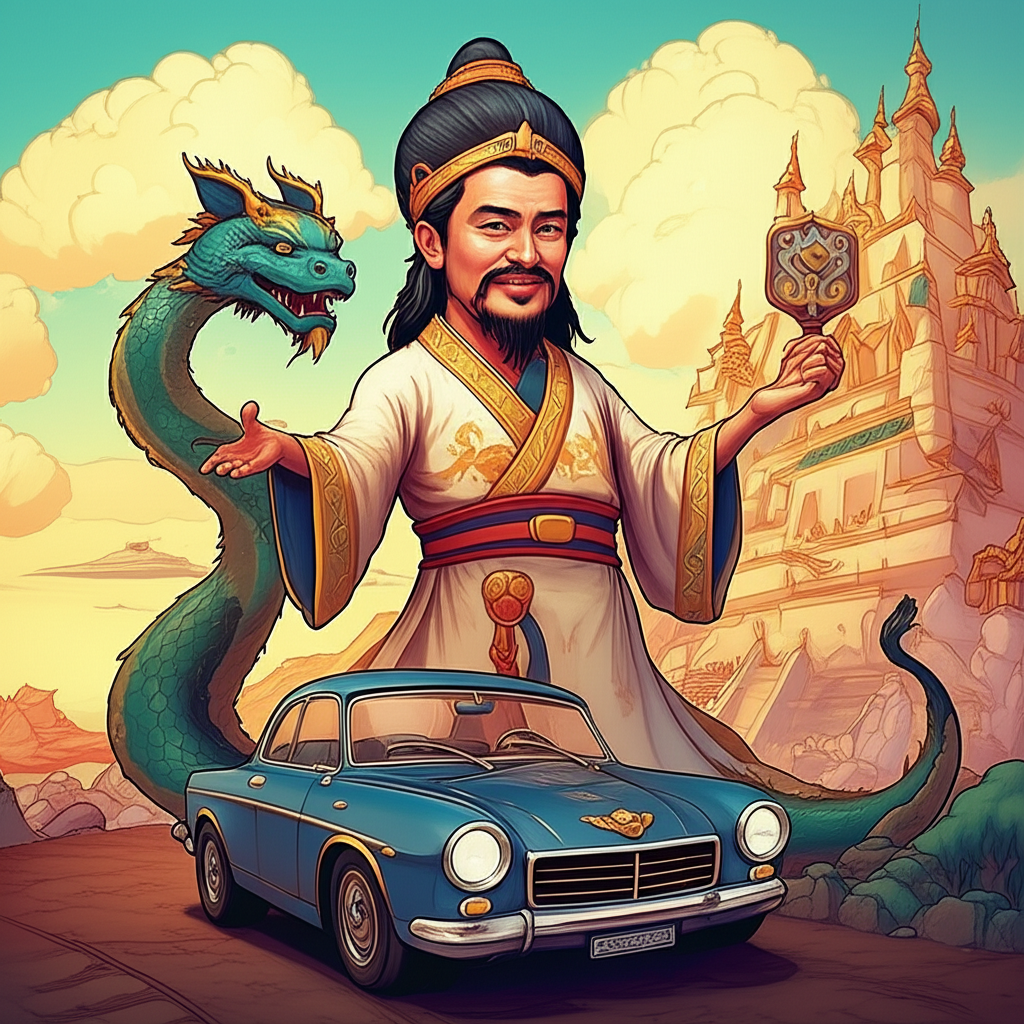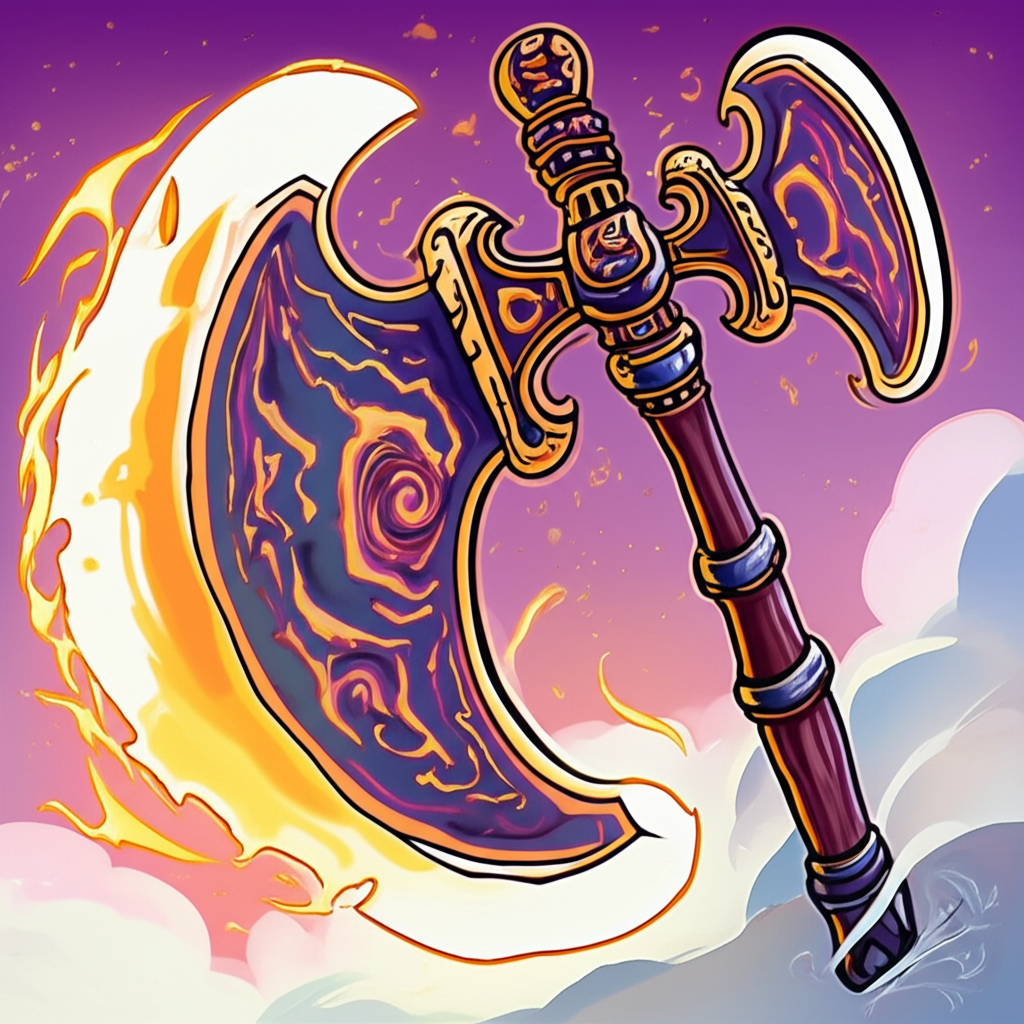
From the mist-shrouded peaks of ancient China, where the Yellow River carves its serpentine path through fertile plains, arises a tapestry of myths and legends, woven from the very fabric of human aspiration and the profound mysteries of the natural world. Among these foundational narratives, the tale of Fuxi and the concept of an "Eternal City" stands as a powerful testament to the ingenuity and worldview of early Chinese civilization. It is crucial to understand that this is a traditional story, a creation of ancient minds seeking to explain the origins of their world and the foundations of their society, not a factual account to be believed.
The cultural milieu from which this story springs is one of agrarian societies, deeply attuned to the cycles of nature. In the vast stretches of Neolithic China, communities were establishing themselves, learning to cultivate the land, domesticate animals, and develop sophisticated social structures. Their understanding of the world was often imbued with animism and a profound respect for the forces of nature – the thunder, the rain, the sun, and the earth. Deities and legendary figures were not distant, abstract concepts but integral parts of the living, breathing world, often embodying natural phenomena or acting as cultural heroes who bestowed essential knowledge upon humanity. The concept of an "Eternal City" would have resonated deeply in such a context, representing a place of ultimate order, perfection, and enduring stability – a stark contrast to the often unpredictable and transient nature of early human settlements.
At the heart of this chronicle lies Fuxi, a figure revered in Chinese mythology as one of the Three Sovereigns, often credited with the very dawn of civilization. He is typically depicted as a being of immense wisdom and benevolence, a benevolent cultural hero rather than a god in the Western sense. His form is often described with a human torso and a serpent’s tail, a duality that symbolizes his connection to both the human realm and the primal, elemental forces of nature. This serpentine attribute is not one of evil or menace, but rather represents earth, fertility, and the cyclical renewal of life. Fuxi’s symbolic attributes are multifaceted: he is the inventor of the bagua (the eight trigrams, fundamental to Taoist philosophy), the founder of marriage, the tamer of beasts, and the one who taught humanity how to fish and hunt. He embodies the transition from a chaotic, primal existence to one of order, knowledge, and social cohesion.
The narrative of Fuxi and the Eternal City unfolds not as a single, monolithic event, but as a series of profound gifts and foundational principles he bestowed upon humanity. Imagine a time when humans lived in a state of near-savagery, their existence a constant struggle for survival, their understanding of the world limited to instinct and immediate need. Fuxi, observing this raw existence from a vantage point of celestial or primal wisdom, felt a calling to elevate humanity.
His greatest gift, perhaps, was the invention of the bagua. Legend states that Fuxi was gazing at the heavens and the earth, observing the patterns of the stars, the flow of rivers, and the growth of plants. He saw a fundamental order, a cosmic dance of complementary forces. From this contemplation, he conceived of the eight trigrams, each representing a fundamental element or concept: Heaven, Earth, Thunder, Wind, Water, Fire, Mountain, and Lake. These trigrams, when combined in different ways, could form 64 hexagrams, a system of divination and understanding that offered insights into the workings of the universe and the nature of human affairs. This was not merely a tool for predicting the future, but a profound framework for comprehending the interconnectedness of all things.
Alongside this intellectual gift, Fuxi is also credited with establishing social order. He recognized the need for structured relationships, for families to be formed and for communities to thrive. He is said to have instituted the practice of marriage, establishing rituals and customs that brought stability and continuity to human life. He also taught humans the art of fishing and hunting, moving them beyond mere foraging and towards more sustainable and organized methods of sustenance. These were not acts of divine decree, but rather the compassionate impartation of knowledge and practical skills, born from observation and a deep understanding of human potential.
The concept of the "Eternal City" is often intertwined with Fuxi’s role as a civilizing force. While not a physical city built by him, it represents the ideal society he helped to establish. This city, existing in the realm of perfect order and harmony, was a metaphor for the ideal state of human civilization – a place where knowledge, order, and prosperity endured. It was a city of the mind and spirit, a testament to what humanity could achieve when guided by wisdom and organized by benevolent principles. The foundations of this "Eternal City" were laid by Fuxi’s teachings: the understanding of cosmic principles through the bagua, the stability of society through marriage, and the sustenance of life through developed skills. It was a vision of a world free from chaos, where human endeavors could flourish indefinitely.
The symbolism embedded within this chronicle is rich and profound. Fuxi himself, with his serpentine form, symbolizes the bridge between the primal, untamed world and the ordered, civilized human existence. His gifts represent the essential pillars of human society: knowledge and understanding (the bagua), social structure and continuity (marriage), and the means of survival and progress (hunting and fishing). The "Eternal City" embodies the ultimate human aspiration for a perfect, enduring civilization, a place of peace, wisdom, and everlasting order. It reflects a deep-seated human desire to create something lasting, something that transcends the fleeting nature of individual lives and the transience of earthly settlements. This myth speaks to the ancient Chinese understanding of the cosmos as an ordered system, and their belief that humanity, through wisdom and proper conduct, could align itself with this cosmic order.
In the modern world, the legacy of Fuxi and the symbolism of the Eternal City continue to resonate. Fuxi is a foundational figure in Chinese culture, his stories retold in literature, opera, and art. The bagua remains a cornerstone of Taoist philosophy and is widely recognized in popular culture, often appearing in art, design, and even martial arts. The concept of an "Eternal City" as an ideal, utopian society is a recurring theme in literature and film across the globe, reflecting a universal human yearning for perfection and stability. In video games, the idea of building and sustaining an enduring civilization often draws upon these archetypal themes of order and progress. Cultural studies scholars analyze these myths to understand the values, beliefs, and societal aspirations of ancient peoples.
In conclusion, the chronicle of Fuxi and the Eternal City is a captivating cultural narrative, a testament to the imaginative power and philosophical depth of ancient Chinese civilization. It is a story told by ancient people to explain their origins, their societal structures, and their aspirations for a better world. As Muslims, we recognize that only Allah (God) is the true Creator and Sustainer of all existence, the ultimate source of all wisdom and order. These ancient stories, however, offer a valuable window into the human experience, showcasing the enduring traditions of storytelling, the power of imagination, and the timeless quest for meaning and understanding that has shaped human cultures for millennia. They remind us of the rich tapestry of human heritage and the diverse ways in which people have sought to comprehend their place in the universe.



